Supporting Autistic Individuals in Romantic Relationships
Fostering Fulfillment in Neurodiverse Love

Understanding and Supporting Autistic Romantic Relationships
Autistic individuals often navigate romantic relationships in ways that differ from neurotypical expectations, which requires a nuanced understanding and supportive strategies. Recognizing the unique ways they experience love, communicate, and manage sensory sensitivities can foster healthier, more satisfying connections. This article explores common experiences, supportive approaches, strategies for enhancing relationship satisfaction, navigating challenges, and available resources for supporting autistic individuals in romantic contexts.
Diverse Love Expressions and Relationship Styles among Autistic Individuals
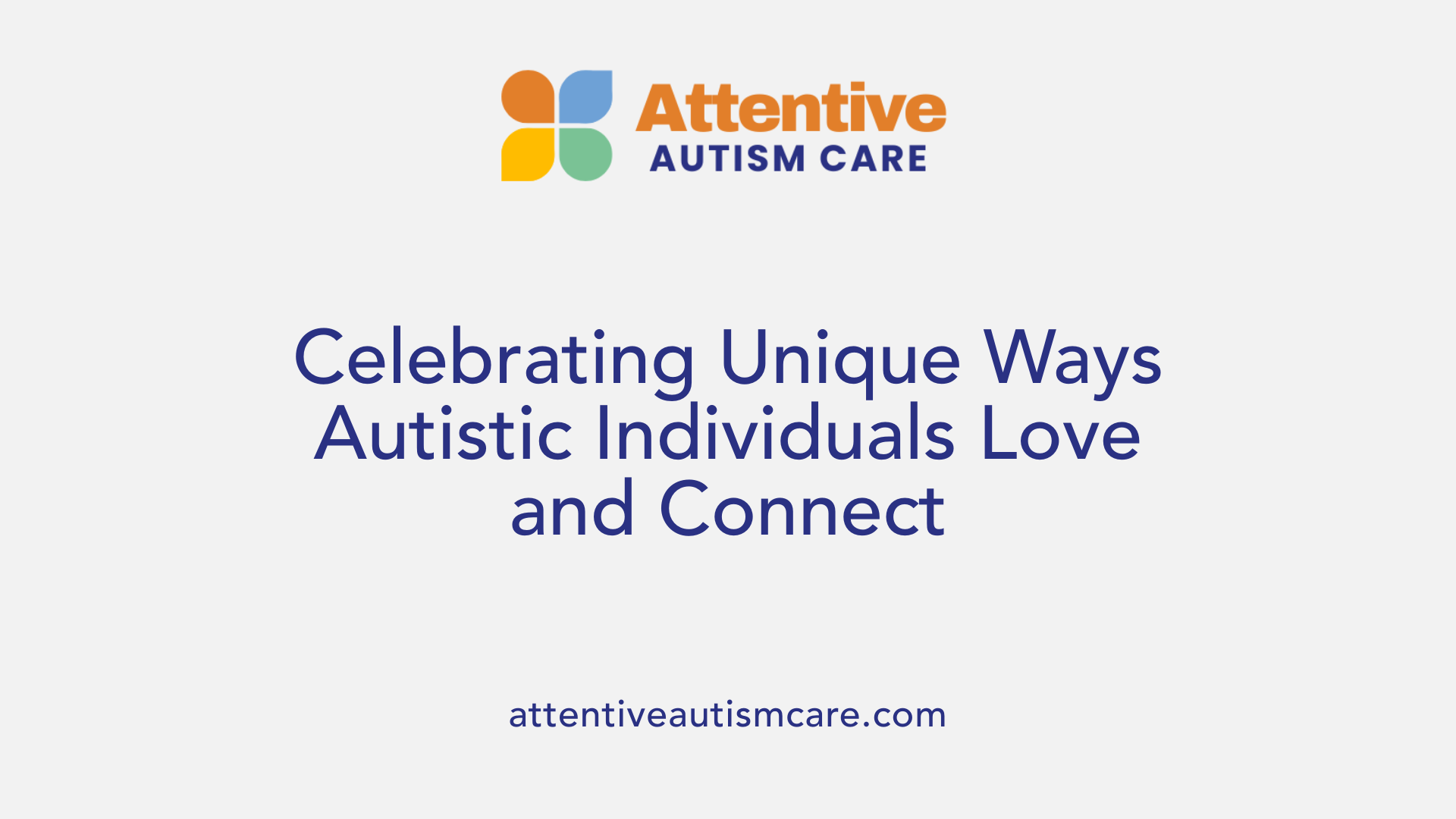
What are common experiences of autistic individuals in romantic relationships?
Autistic individuals often have unique ways of experiencing and expressing love. Their expressions may differ from typical societal norms, emphasizing actions, shared activities, or direct communication. Many value honesty and clarity, preferring straightforward conversations over subtle hints or indirect cues.
Sensory sensitivities can influence comfort levels during physical contact or shared environments, affecting intimacy and relationship activities. Autistic people might also have intense interests and routines that shape how they connect with partners. Loyalty, attentiveness to detail, and shared interests are frequently seen as strong foundations.
Challenges such as interpreting non-verbal communication, managing social expectations, or adapting to sensory overload are common. However, with understanding, patience, and supportive communication, many autistic individuals build fulfilling, long-lasting relationships.
Some prefer non-traditional relationship models, like non-monogamy or relationships that are non-sexual, as these can better meet their emotional and sensory needs. Overall, their love stories showcase resilience and depth, emphasizing that love for autistic individuals can be profound and meaningful. Awareness and accommodations are essential for nurturing these connections.
Supporting Through Education and Empathy
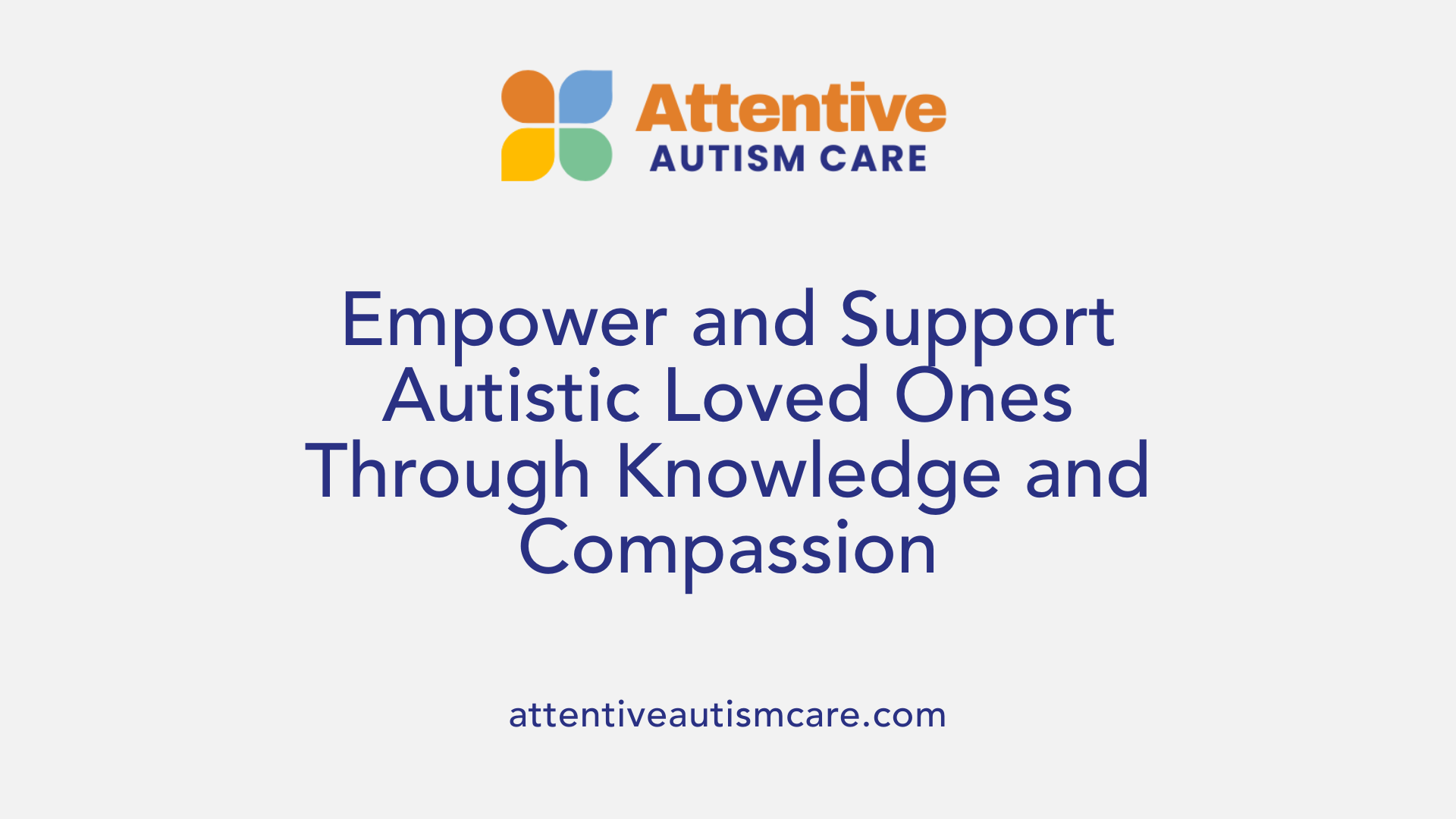
How can partners and families support autistic individuals in romantic relationships?
Supporting autistic individuals involves understanding and respecting their unique ways of experiencing love, communication, and connection. Partners and families can play a vital role by fostering open, honest, and explicit communication. Since many autistic people prefer direct language or non-verbal cues, adapting communication styles helps prevent misunderstandings and builds trust.
Educating oneself about autism, sensory sensitivities, and preferred communication methods makes it easier to provide meaningful support. Recognizing that expressions of affection may differ — such as actions or shared interests rather than verbal declarations or physical touch — is essential. Supporting autistic loved ones also means respecting their routines, boundaries, and special interests, which are often sources of joy and stability.
Creating a safe and accepting environment encourages autistic individuals to express their needs and desires without fear of judgment. Encouraging independence and considering non-traditional relationship models, like polyamory or living separately, can align with their preferences and needs.
Accessing autism-specific resources, community programs, and professional therapy can foster healthier relationships. These tools offer strategies for emotional validation, social skills development, and managing sensory sensitivities.
Ultimately, a relationship built on patience, understanding, and mutual respect can thrive when both partners and families embrace neurodivergence and support authentic expressions of love. This compassionate approach helps autistic individuals enjoy fulfilling, satisfying relationships that honor their identity and needs.
Enhancing Relationship Satisfaction with Specific Strategies
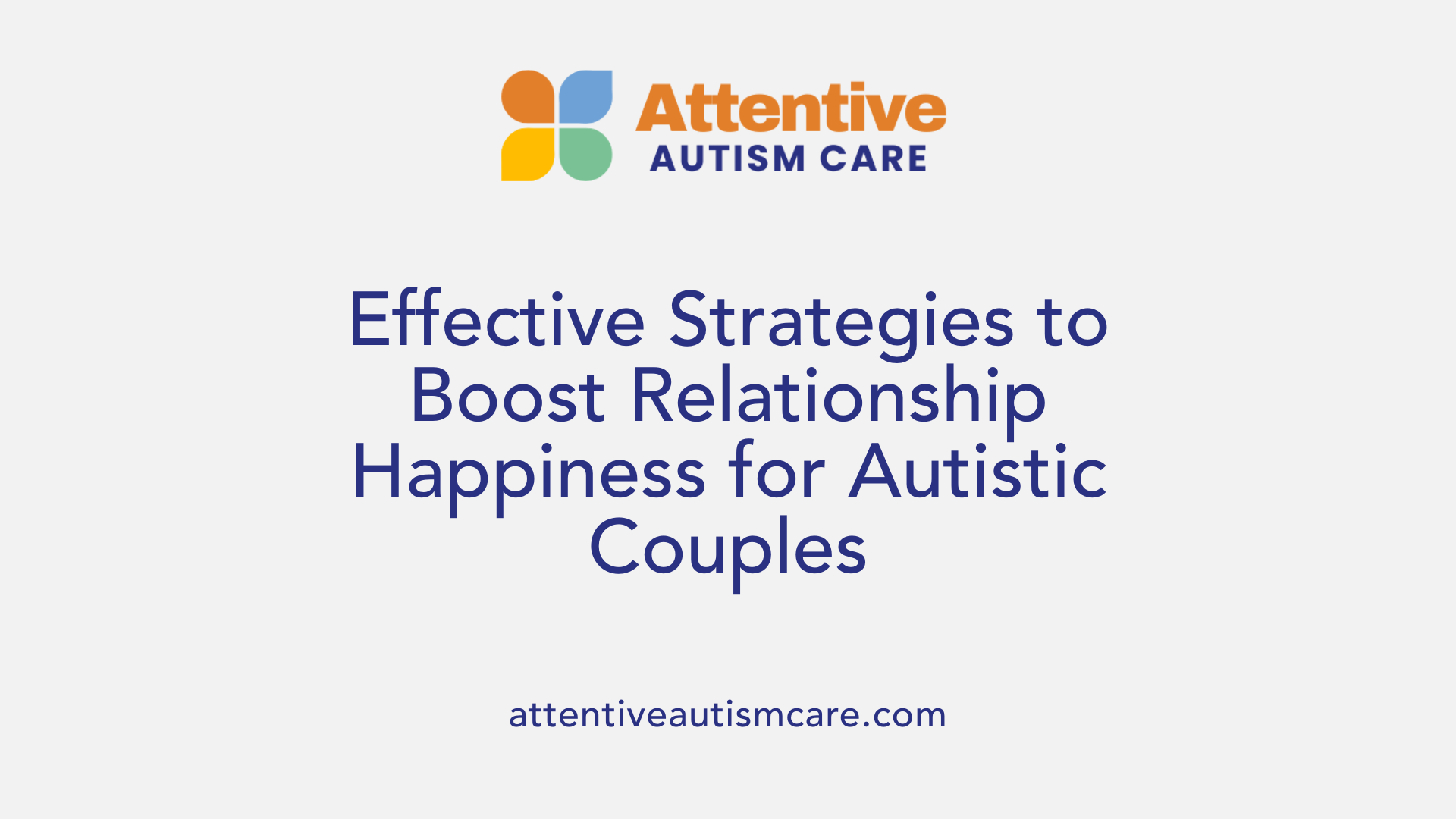
What strategies can be used to enhance relationship satisfaction for autistic individuals?
Improving relationship satisfaction for autistic individuals involves a combination of understanding, communication, and mutual support tailored to their unique needs. One fundamental aspect is focusing on partner responsiveness. When partners actively listen, validate feelings, and adapt to each other's communication styles, they create a strong foundation of trust and mutual understanding.
Communication tailored to autistic needs plays a vital role. Many autistic people prefer direct, clear language and may find indirect hints or nuanced social cues confusing. Using straightforward dialogue, setting boundaries openly, and employing visual aids or technology can help convey feelings and needs effectively.
Integrating routines and shared interests fosters stability and comfort. Engaging in activities that both partners enjoy, especially those aligned with special interests, encourages connection and reduces stress. Sensory preferences should also be respected—creating sensory-friendly environments ensures comfort during shared experiences.
Supporting each other through mutual understanding and acceptance enhances relationship health. Employing relationship counseling with professionals experienced in autism can address specific challenges, promote skill development, and offer strategies for overcoming misunderstandings.
In summary, successful relationships for autistic individuals often hinge on conscious efforts toward responsive communication, shared routines, and embracing neurodivergent differences. Prioritizing these areas nurtures deeper emotional bonds, leading to more fulfilling and satisfying partnerships.
Navigating Challenges and Building Resilience in Autistic Relationships
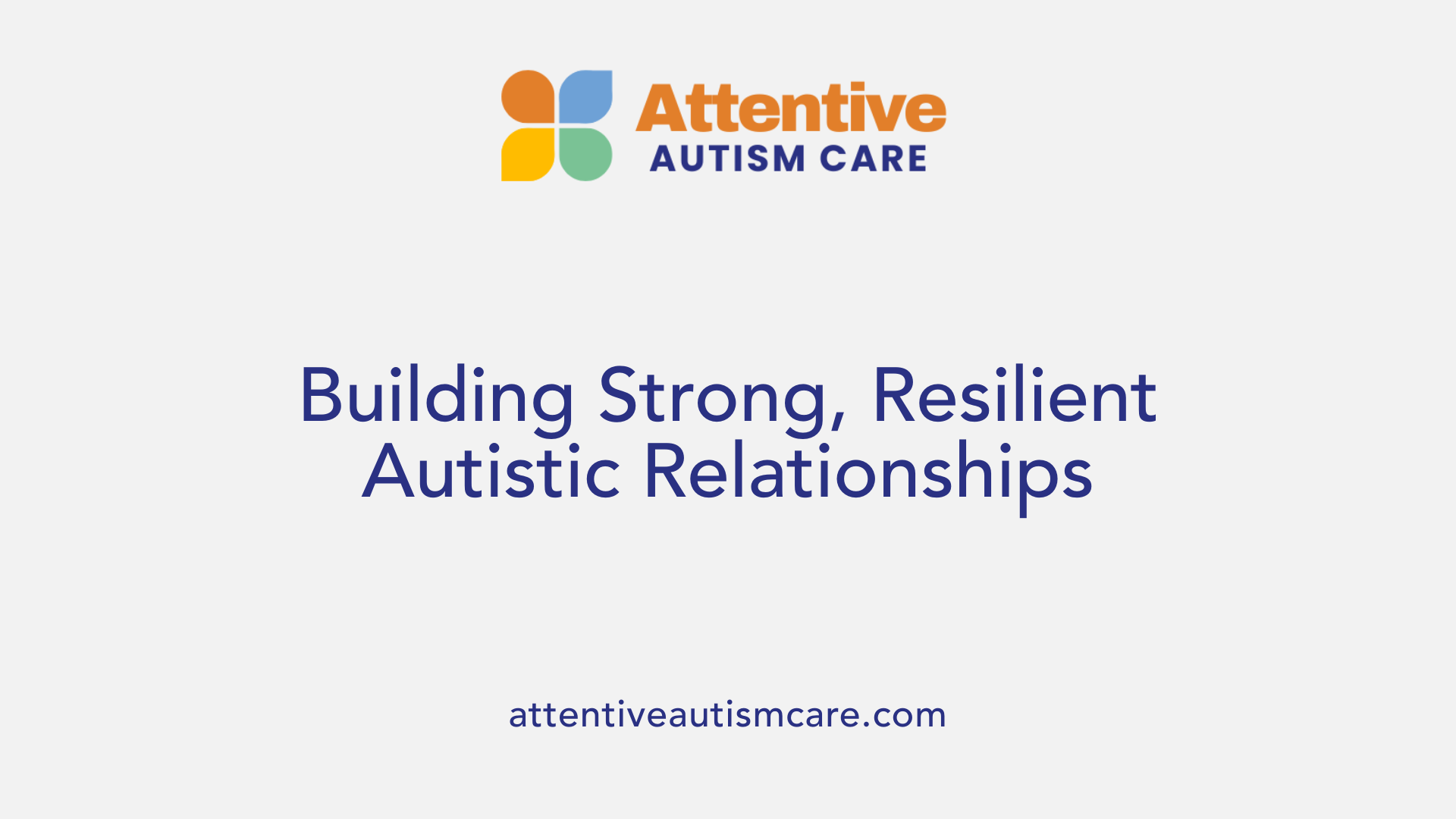
How can couples navigate relationship challenges related to autism?
Autistic individuals often experience and express love in ways that may differ from traditional expectations. To build a strong partnership, open and honest communication is fundamental. Recognizing that autistic partners might find interpreting non-verbal cues, like facial expressions or body language, challenging is important. Using clear, direct language helps reduce misunderstandings.
Sensory sensitivities are common and can influence how and where couples choose to spend time. Making environmental adaptations—such as creating quiet, sensory-friendly spaces or adjusting lighting and sounds—can significantly increase comfort.
Supporting routines provides predictability, which many autistic people find grounding. However, couples can also foster spontaneity by planning small surprises or making gradual changes to shared routines, respecting each partner’s comfort levels.
Educating both partners about autism traits, strengths, and challenges fosters patience, curiosity, and empathy. This mutual understanding helps in managing stress and navigating conflicts.
Ultimately, fostering a relationship that emphasizes empathy, patience, and shared strategies to cope with sensory overload, emotional complexity, and routine management can cultivate resilience and deepen connection despite challenges.
Resources for Education and Skill Development
There is a wealth of resources available designed to support autistic individuals and their partners in understanding and nurturing healthy romantic relationships. These include a variety of books, webinars, and therapy programs tailored to address social skills, sexuality, and relationship building for autistic people.
Organizations such as Autism Speaks, the Autism Society, and UCLA PEERS offer targeted programs, support groups, and online courses that facilitate social development. These programs often include workshops, social skills training, and advice on managing sensory sensitivities and communication differences.
Online communities and support networks, like Hiki and various social platforms, provide safe spaces for neurodivergent individuals to find peer support, share experiences, and explore romantic opportunities. These platforms promote understanding and connection within the autistic community.
Specialized tools and aids are also available to assist with communication challenges and sensory sensitivities. For example, visual schedules, communication apps, and sensory-friendly resources help autistic individuals express themselves more comfortably and navigate shared activities.
Collectively, these resources aim to increase awareness, develop practical relationship skills, and foster confidence in forming meaningful emotional connections. They serve as critical supports that empower autistic individuals to pursue fulfilling romantic and social lives.
| Resource Type | Examples | Focus Area | |--------------|------------|--------------| | Books and Guides |
Social Skills, Sexuality, and Relationship Needs in Autistic Life
How do social skills, sexuality, and relationship needs differ for autistic individuals?
Many autistic individuals share similar desires for love, intimacy, and connection as neurotypical people. They want to build meaningful relationships and explore their sexuality. However, they often face distinctive challenges.
Autistic people may find it difficult to interpret social cues such as body language, facial expressions, or tone of voice. This can lead to misunderstandings about boundaries, consent, and emotional needs in romantic contexts.
Sensory sensitivities can influence comfort levels with physical touch, environments, or shared activities, impacting intimacy and dating experiences. Their communication style may be more direct and literal, which can sometimes be misunderstood by neurotypical partners accustomed to indirect hints or subtle cues.
Sexuality and gender diversity are notably prevalent among autistic populations. Higher rates of gender dysphoria and non-heterosexual orientations have been reported, emphasizing the importance of inclusive, affirming support.
Limited comprehensive sex education tailored for autistic individuals can leave them vulnerable to misinformation or exploitation. Without accessible guidance, they may struggle to understand their own desires or how to navigate relationships safely.
Support tailored to their needs—such as explicit social skills training, honest and clear communication, and sensory-friendly environments—can enhance their ability to form satisfying relationships.
Providing accessible education and fostering environments of acceptance helps autistic individuals explore their sexuality confidently and develop healthy relationships.
Insights from Personal and Community Experiences
How can we better support autistic loved ones in relationships through personal experiences and insights?
Supporting autistic loved ones in relationships involves understanding their unique perspectives and needs. Many autistic individuals find that alternative relationship styles, such as non-monogamy, living separately, or non-sexual arrangements, better suit their ways of connecting. Recognizing that autistic love can be intense, genuine, and different from traditional expectations helps foster acceptance.
Personal stories highlight the importance of open and direct communication. Autistic partners often prefer clear, literal language and may have difficulties interpreting non-verbal cues like body language or tone. Respecting these communication preferences enables stronger bonds and reduces misunderstandings.
Sharing coping strategies, such as planning sensory-friendly activities or creating predictable routines, supports comfort and stability in relationships. Patience and empathy are essential, especially when navigating sensory sensitivities or special interests that might influence relationship dynamics.
Community experiences reinforce that providing accessible resources—like specialized counseling and social skills training—can enhance relationship satisfaction. Support groups help autistic individuals and their partners connect, share insights, and learn from each other’s journeys.
Empathy and acceptance form the foundation of fulfilling relationships. Respecting differences, supporting boundaries, and embracing diverse ways of expressing love—whether through actions, loyalty, or shared interests—show genuine care.
Ultimately, fostering understanding and supportive environments where autistic loved ones feel valued and authentic in their expressions leads to healthier, more satisfying relationships for all involved.
| Aspect | Support Strategies | Additional Notes |
|---|---|---|
| Communication | Use direct language, clarify needs | Supplants assumptions about social cues |
| Sensory Needs | Sensory-friendly environments, routines | Recognize sensitivities to touch, light, noise |
| Special Interests | Incorporate into shared activities | Practical for engagement and bonding |
| Emotional Support | Patience, open dialogue | Helps address misunderstandings |
| Community Resources | Counseling, online groups | Builds skills and confidence |
Effective Communication Techniques for Neurodiverse Couples
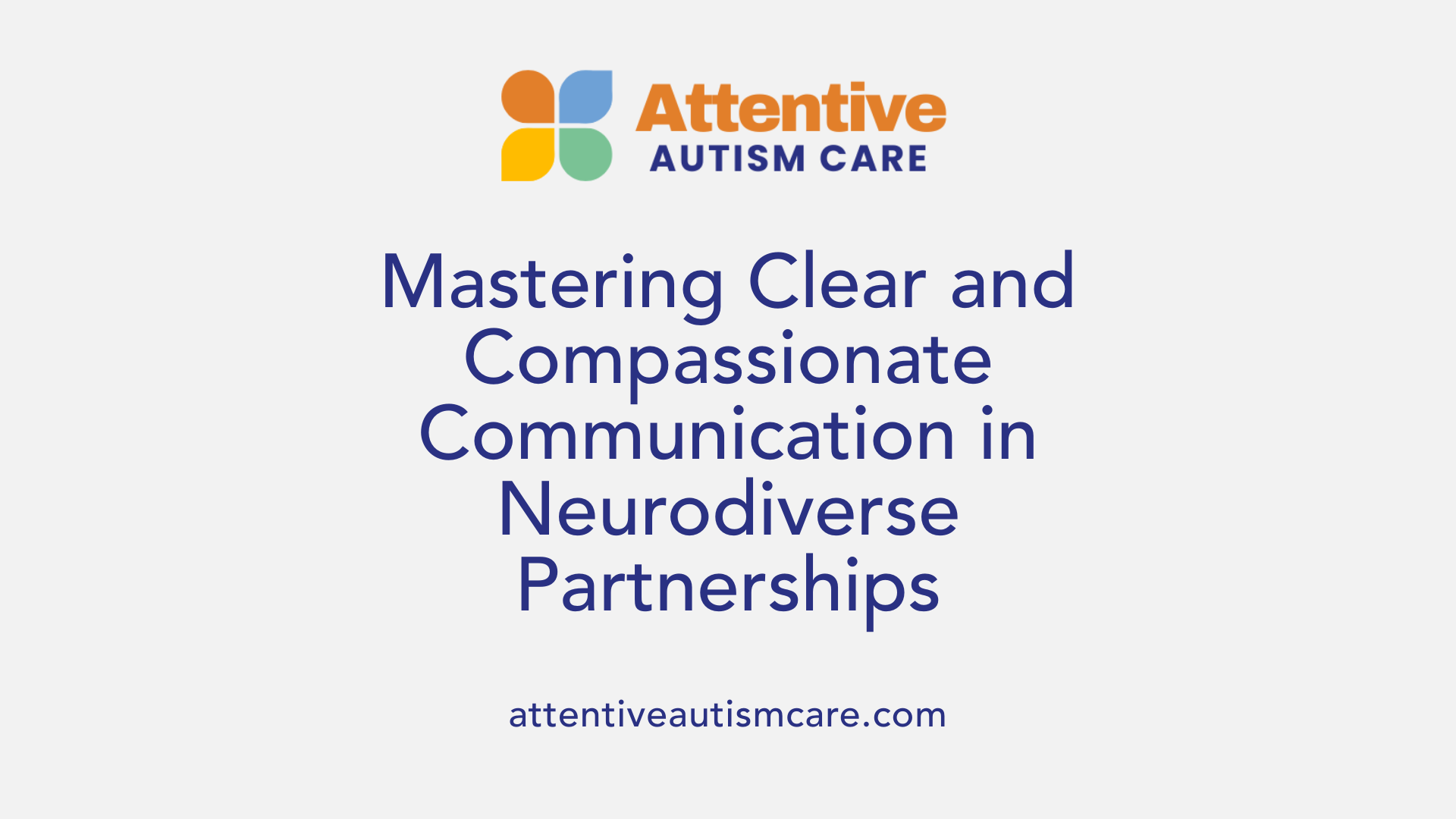
What are effective ways to improve communication and understanding in relationships involving autism?
For couples where one or both partners are autistic, establishing effective communication practices is essential for nurturing understanding and intimacy. One of the most straightforward methods involves using clear and direct language. Autistic individuals often interpret words literally, so avoiding ambiguity and generalizations helps prevent misunderstandings.
Seeking confirmation and asking for clarification during conversations ensures that both partners are on the same page. This proactive step can reduce confusion and foster trust.
In addition to verbal communication, many autistic people benefit from visual supports and alternative methods. Using visual aids like charts, pictures, or written notes can clarify complex ideas or feelings. Social stories or visual schedules can also serve as useful tools to explain social expectations or future plans.
Employing alternative communication methods such as augmentative and alternative communication (AAC), non-verbal cues, or gestures can enhance mutual understanding. Some may prefer non-verbal expressions of love and care, like acts of service or shared interests, over traditional verbal affirmations.
Building emotional closeness can be achieved by engaging in shared activities that both partners enjoy. These can range from hobbies to routines that reinforce connection and foster a sense of teamwork.
Fostering comfortable environments where sensory sensitivities are acknowledged—such as choosing sensory-friendly settings—also contributes to better interactions.
Acceptance of each other's differences and flexibility in communication styles are crucial. Embracing non-traditional relationship models, like polyamory or non-monogamy, if they fit the partners’ needs, can also support fulfillment.
Finally, patience, positive assumptions, and practicing these strategies consistently cultivate a supportive foundation. Tailoring communication methods to individual preferences not only improves dialogue but also deepens emotional bonds.
| Strategy | Description | Additional Notes |
|---|---|---|
| Clear language | Use simple, literal expressions to avoid misunderstandings | Be mindful of tone and context |
| Visual supports | Charts, pictures, written notes | Useful for complex topics |
| Alternative methods | AAC, gestures, non-verbal cues | Accommodates sensory sensitivities |
| Shared activities | Hobbies, routines | Reinforces connection and joy |
| Environment considerations | Sensory-friendly settings | Reduces discomfort and stress |
| Flexibility and acceptance | Embrace communication differences | Supports healthier relationships |
Understanding and implementing these communication techniques creates a foundation for strong, meaningful relationships within neurodiverse partnerships, promoting mutual respect and emotional safety.
Building a Framework for Support and Understanding
Supporting autistic individuals in romantic relationships involves embracing neurodivergence, fostering open communication, and providing tailored support that respects individual differences. Education, empathy, and resource accessibility are fundamental in creating an environment where love can thrive despite challenges. With mutual patience and understanding, both partners and families can cultivate deep, meaningful, and fulfilling relationships that celebrate diversity in love.
References
- Navigating Love and Relationships as an Autistic Adult
- How Autistic People Experience Romantic Relationships ...
- Family relationships - a guide for partners of autistic people
- Understanding Autism and Relationships
- Love and Dating Resources
- Factors of relationship satisfaction for autistic and non- ...
- Autism and marriage
- Tips for Nurturing Autism and Relationships with Confidence
- Navigating Love and Relationships as an Autistic Adult
- How Autistic People Experience Romantic Relationships ...




































































































